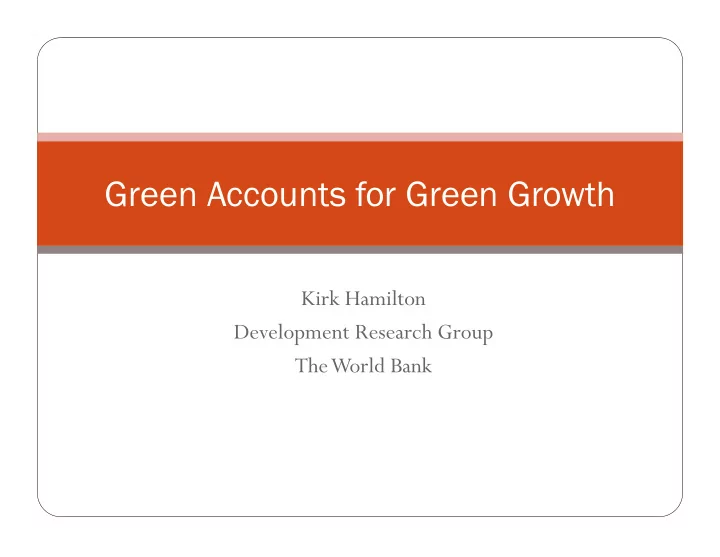

Green Accounts for Green Growth Kirk Hamilton Development Research Group The World Bank
Outline Why How What Who Is it sound? Challenges Using green accounts
Why green accounts Measuring unsustainability Every year 20-30 countries in the Word Development Indicators have negative ‘adjusted’ net saving Policies for green growth will have pervasive effects An aggregate measure of greening will be useful in measuring performance
How we measure development will drive how we do development Adjusted Net National Income (aNNI) Adjusted Net Savings (ANS) aNNI = aNNI = Gr Gross N Nationa nal Inc l Income me ANS = = Gr Gross N Nationa nal S l Saving ngs - De Depreciation n + E Education e n expend nditure - R - Resource d deple letion n - De Depreciation n - R - Resource d deple letion n - Pollu - P llution d n dama mage Why f y focus o on ne n net s saving ngs? B Because d develo lopme ment nt i is a about build lding ng w wealt lth – h – o only t nly thi his w will i ll inc ncrease f future w well-b ll-being ng
Measuring economic performance in resource-dependent African countries Billion $2005 200 180 160 140 120 100 80 60 40 1990 1991 1992 1993 1994 1995 1996 1997 1998 1999 2000 2001 2002 2003 2004 2005 2006 2007 2008 Real ¡GDP Real ¡aNNI Growth rates 2000 to 2008: GDP 6.4%, aNNI 3.8%
Saving for growth and development: the Finance minister is getting the wrong picture 30 20 10 0 1990 1991 1992 1993 1994 1995 1996 1997 1998 1999 2000 2001 2002 2003 2004 2005 2006 2007 2008 -‑10 -‑20 -‑30 Gross ¡Domestic ¡Saving ¡%GDP Adjusted ¡Net ¡Saving ¡%GNI
Who is doing green accounting? Australia France Norway Austria Germany Philippines Botswana Guatemala Slovak Rep. Brazil Indonesia South Africa Canada Japan Sweden Chile Korea UK Czech Rep. Mexico Denmark Namibia Estonia Netherlands Finland New Zealand
Who should be doing green accounting? Low income countries Middle income countries Low income countries – tangible China – Depletion and wealth per capita, $2005 degradation 2009 %GNI 2500 Energy depletion 2.9 2000 Mineral depletion 0.2 PM 10 health damage 2.8 1500 Air pollution material damage 0.5 1000 Water pollution health damage 0.5 Soil nutrient depletion 1.0 500 Carbon dioxide damage 1.1 0 Total 9.0 Natural ¡ Produced ¡ capital capital
Is green accounting sound? Rooted in a body of growth theory going back to Weitzman (1976) What to measure and how to measure it The World Bank’s Adjusted Net Saving figures have been tested empirically – saving is correlated with future changes in consumption in developing countries: Ferreira and Vincent (2005), Ferreira, Hamilton and Vincent (2008) Underpinned by a large literature on valuing environmental assets and health damages
Challenges - methodology Some assets are difficult to value, e.g. biodiversity, while substitution possibilities may be limited for others Valuing ecosystems services – need the underlying physical data and science (WAVES partnership) Non-convexities and non-linearities in the natural world Positive net saving only provisionally indicates sustainability – need better data, models
Challenges - epistemology ‘GDP fixation’ of Dept of Finance The central problem of economics is to maximize social welfare, not production ‘Environment is a luxury good’ and you can ‘ride the Kuznets curve’ 200 1.5 Average ¡annual ¡SO2 ¡concentration ¡ (ug/m3) 180 1.4 CO2 ¡emissions ¡(billion ¡tons ¡CO2) 160 1.2 140 1.1 Japan 120 0.9 - SO2 concentrations 100 0.8 80 0.6 - CO2 emissions 60 0.5 vs. GDP / capita 40 0.3 20 0.2 0 0.0 5,000 10,000 15,000 20,000 25,000 30,000 35,000 40,000 GDP ¡per ¡capita ¡(constant ¡2009 ¡international ¡ dollars)
Using the accounts – a hypothetical ‘green decade’ China gross & net product, 2005-2030, $trn 2004 dollars 12.0 10.0 8.0 6.0 4.0 2.0 0.0 2005 2010 2015 2020 2025 2030 GDP, ¡BAU aNDP, ¡BAU aNDP, ¡green ¡growth Rate ¡of ¡growth Rate ¡of ¡growth 2010-‑2020 2020-‑2030 ¡GDP, ¡BAU ¡ 7.4% 4.2% aNDP, ¡BAU 7.4% 4.2% aNDP, ¡green ¡growth 8.2% 4.2%
Conclusions We know how to green the accounts, theory guides methodology, and empirical tests have been positive Many countries are working on green accounts Depletion and damages are significant in many developing countries There are accounting challenges, particularly on biodiversity, substitution possibilities and non-linearities We need to shift the focus of policy-making from production to wellbeing Green policies will boost the level and growth of green accounting aggregates
Thank you! www.worldbank.org/environmentaleconomics
Recommend
More recommend